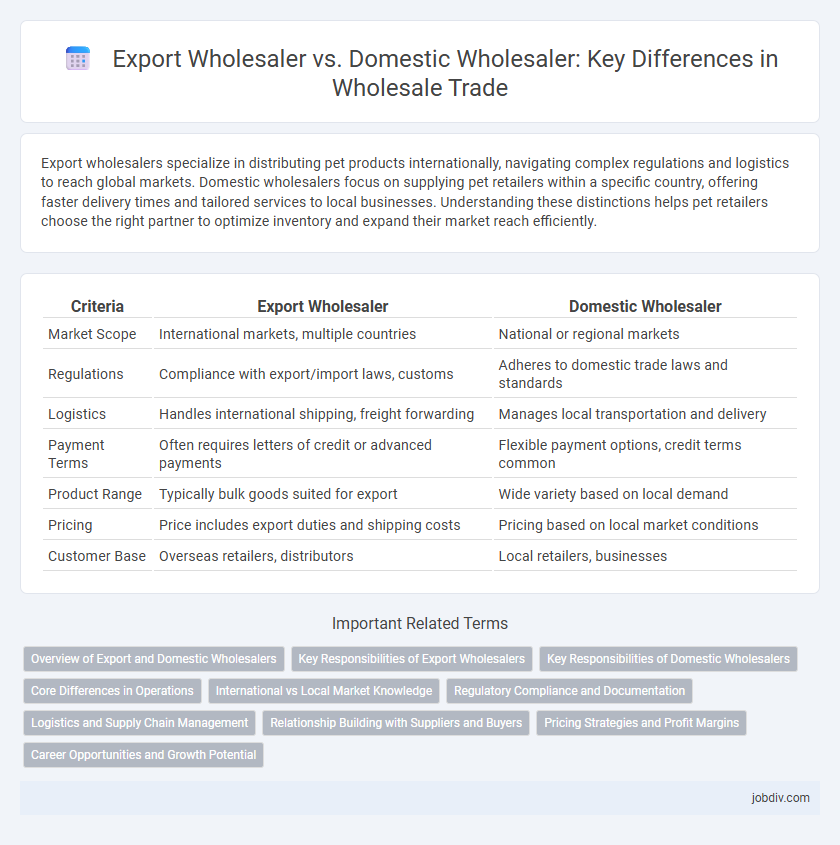Export wholesalers specialize in distributing pet products internationally, navigating complex regulations and logistics to reach global markets. Domestic wholesalers focus on supplying pet retailers within a specific country, offering faster delivery times and tailored services to local businesses. Understanding these distinctions helps pet retailers choose the right partner to optimize inventory and expand their market reach efficiently.
Table of Comparison
| Criteria | Export Wholesaler | Domestic Wholesaler |
|---|---|---|
| Market Scope | International markets, multiple countries | National or regional markets |
| Regulations | Compliance with export/import laws, customs | Adheres to domestic trade laws and standards |
| Logistics | Handles international shipping, freight forwarding | Manages local transportation and delivery |
| Payment Terms | Often requires letters of credit or advanced payments | Flexible payment options, credit terms common |
| Product Range | Typically bulk goods suited for export | Wide variety based on local demand |
| Pricing | Price includes export duties and shipping costs | Pricing based on local market conditions |
| Customer Base | Overseas retailers, distributors | Local retailers, businesses |
Overview of Export and Domestic Wholesalers
Export wholesalers specialize in selling goods to international markets, navigating complex customs regulations and global logistics to connect manufacturers with foreign buyers. Domestic wholesalers focus on distributing products within a specific country, optimizing supply chains for local demand and regional market conditions. Both types of wholesalers play crucial roles in ensuring efficient product flow from producers to retailers or end consumers.
Key Responsibilities of Export Wholesalers
Export wholesalers manage international logistics, including customs documentation and compliance with export regulations to facilitate smooth cross-border transactions. They coordinate with freight forwarders and shipping companies to ensure timely delivery while negotiating terms with foreign buyers to meet diverse market demands. Their responsibilities also include market research to identify global trends, adapting product offerings to suit different cultures, and handling currency exchange risks.
Key Responsibilities of Domestic Wholesalers
Domestic wholesalers primarily manage the procurement and distribution of goods within a specific country, ensuring smooth inventory control and prompt delivery to retailers. They focus on building strong local supplier relationships and understanding regional market demand to optimize stock levels and pricing strategies. Their key responsibilities include maintaining domestic supply chain efficiency, providing customer service to local clients, and adhering to national regulations and standards.
Core Differences in Operations
Export wholesalers specialize in distributing goods across international borders, managing complexities like customs regulations, foreign currency transactions, and international shipping logistics. Domestic wholesalers focus on local or national markets, emphasizing faster delivery times, regional market knowledge, and compliance with local trade laws. Their operational scope dictates distinct procurement strategies, inventory management, and customer relationship approaches tailored to either global or domestic demand.
International vs Local Market Knowledge
Export wholesalers possess in-depth knowledge of international trade regulations, foreign market demands, and cross-border logistics, enabling efficient global distribution. Domestic wholesalers specialize in local market trends, consumer preferences, and regional supply chain dynamics, ensuring tailored product availability within a specific country. Mastery of international market complexities distinguishes export wholesalers from domestic counterparts focused primarily on local business environments.
Regulatory Compliance and Documentation
Export wholesalers must navigate complex international regulatory compliance, including customs regulations, export licenses, and trade tariffs, ensuring accurate documentation such as commercial invoices, packing lists, and certificates of origin. Domestic wholesalers primarily adhere to local regulations like sales tax laws and product safety standards, with simpler documentation involving purchase orders and delivery receipts. Effective management of export compliance minimizes legal risks and delays in global supply chains, distinguishing export wholesalers from their domestic counterparts.
Logistics and Supply Chain Management
Export wholesalers coordinate complex logistics involving international freight forwarding, customs clearance, and global distribution networks to ensure timely delivery across borders. Domestic wholesalers optimize supply chain management by focusing on regional transportation, warehousing efficiency, and inventory turnover within national markets. Advanced tracking technologies and strategic partnerships are crucial for export wholesalers to navigate global trade regulations, while domestic wholesalers leverage localized supply chains to reduce costs and improve responsiveness.
Relationship Building with Suppliers and Buyers
Export wholesalers cultivate strong, trust-based relationships with international suppliers and buyers, navigating cross-border challenges to ensure consistent product quality and timely delivery. Domestic wholesalers emphasize close, ongoing interactions with local suppliers and buyers, enabling rapid response to market changes and personalized service. Both rely heavily on effective communication, reliability, and collaborative problem-solving to strengthen supply chain partnerships and drive business growth.
Pricing Strategies and Profit Margins
Export wholesalers often adopt competitive pricing strategies to accommodate international market variations, factoring in currency fluctuations, tariffs, and shipping costs which tend to compress profit margins. Domestic wholesalers have greater pricing flexibility, leveraging lower logistical expenses and more predictable regulatory environments to maintain higher profit margins. Both types strategically adjust markups based on market demand, volume discounts, and regional economic conditions to optimize profitability.
Career Opportunities and Growth Potential
Export wholesalers offer career opportunities with a global scope, providing expertise in international trade regulations, logistics, and cross-cultural communication. Domestic wholesalers focus on local market dynamics, supply chain management, and relationship-building with regional retailers, offering strong growth potential in niche markets. Both paths require strong negotiation skills and adaptability, but export wholesaling often leads to higher earning potential due to exposure to larger markets.
Export Wholesaler vs Domestic Wholesaler Infographic

 jobdiv.com
jobdiv.com